2008 年河北省中考英语真题及答案
卷Ⅰ(选择题,共 95 分)
听力部分(第一节)
Ⅰ、听句子,选出句子中所包含的信息。(共 5 小题,每小题 1 分,计 5 分)
1. A. watching
2. A. $235
3. A. this September
4. A. a white shirt
5. A. I only like the last story.
B. walking
B. $212
B. next September
B. a black shirt
C. washing
C. $325
C. this December
C. a black skirt
B. I don’t like the last story at all.
C. I like the last story better than any other one.
Ⅱ、听句子,选出该句的最佳答语。(共 5 小题,每小题 1 分,计 5 分)
6. A. She’s a nurse.
7. A. Beijing is great!
8. A. I guess so.
9. A. Thanks, I’d love to.
10.A. Don’t worry.
Ⅲ、听对话和问题,选择正确的选项。(共 5 小题,每小题 1 分,计 5 分)
11. How’s the weather outside?
B. She’s very busy.
B. Thank you. I hope so.
B. I don’t think so.
B. It doesn’t matter.
B. You can’t miss it.
C. She’s at work.
C. You too. Thank you.
C. I am happy for you.
C. You’d better not.
C. Sorry, I’m new here.
A. It’s rainy.
B. It’s nice.
C. It’s cloudy.
12. who is answering the phone?
A. Mary.
B. John.
C. Betty.
13. What time does Bill get up these days?
A. At 6:00.
B. At 7:00.
14. What’s Alan’s favourite ball game?
C. At 8:00.
15. What does the man want to have for his meal?
Ⅳ、听对话、短文和问题,选择正确答案。(共 5 小题,每小题 2 分,计 10 分)
16. What season do you think it is now?
A. It’s summer.
B. It’s winter.
C. It’s spring.
17. Why do they go to the beach for their holiday?
A. Because they can swim there.
B. Because there are lots of hotels.
C. Because they can get relaxed there.
18. Where did Sky grow up?
A. In New York.
B. In Chicago.
C. In Washington.
19. What languages is Sky studying now?
A. Chinese and Russian.
B. Chinese and Japanese.
C. Russian and Japanese.
20. What does Sky enjoy doing in the free time?
�
A. Riding, cooking and doing sports.
B. Reading, cooking and doing sports.
C. Fishing, reading and doing sports.
笔试部分
Ⅴ、单项选择(共 20 小题,每小题 1 分,计 20 分)
选出可以填入空白处的最佳选项。
21. My father is ______ engineer. He works very hard.
A. a
B. an
C. the
22. Look at the photo. The girl beside ______ is Nancy.
A. I
B. my
C. me
23. You must ride your bike ______ the right side of the road.
A. at
B. on
C. in
24. Can you imagine what life will be like in ______ time?
D. 不填
D. mine
D. for
A. 20 years’
D. 20-years
25. The air in the countryside is ______. So many people from the city go there on weekends.
D. delicious
C. 20-years’
B. 20 year’s
B. pretty
C. fresh
A. soft
26. There ______ a lot of rain in this area in August every year.
A. is
D. were
27. The children ______ a P.E. class on the playground when it suddenly began to rain.
B. was
C. are
A. have
B. are having
C. had
D. were having
28. I tried several jackets on, but ______ of them looked good.
C. none
B. either
A. both
D. neither
29. ______ wonderful movie! We like it very much.
A. What
B. What a
C. How
D. How a
30. Susan will not arrive at the airport on time ______ she hurries up.
A. once
B. if
C. when
D. unless
31. David jumped ______ in the long jump. He won the game!
A. longest
B. farthest
C. fastest
D. highest
32. Nick ______ a new camera. He has taken lots of pictures with it.
A. buys
B. is buying
C. bought
D. will buy
33. – Please bring your homework to school tomorrow, Steven.
-- OK. I ______.
A. will
C. do
34. Thomas, please be quiet. The others ______ hear very well.
B. won’t
D. don’t
A. can’t
B. mustn’t
C. shouldn’t
D. needn’t
35. Last year, Li Hua, a college student, ______ to work for the Olympic Games.
A. is choosing
B. is chosen
C. was choosing
D. was chosen
36. This is the dictionary ______ Mum gave me for my birthday.
C. whose
A. which
B. what
D. whom
37. ______ those lights, please. Don’t use so much energy.
A. Take off
B. Put on
C. Turn off
D. Turn on
38. How’s Annie? I ______ her for a long time.
A. don’t see
B. won’t see
C. didn’t see
D. haven’t seen
39. We are going for a picnic tomorrow. I’ll call Wendy to make sure ______.
A. why to start
B. when to start
C. what to start
D. which to start
40. You are growing so fast. Can you tell me ______ now?
A. how fast are you
B. how fast you are
C. how tall are you
D. how tall you are
Ⅵ、完型填空(共 10 小题,每小题 1 分,计 10 分)
阅读下面短文,掌握其大意,然后从各小题所给的四个选项中选出最佳选项。
These days, it is easier for us to travel to other countries than ever before. However, there
when we meet people in other countries – we cannot
where English is still not spoken, though it is the most
if there was one language that could be understood
is a big difficulty that most of us
communicate with them. There are
widely know language. So, wouldn’t it be
41
42
43
�
by anyone anywhere in the world?
45
Esperanto that was created in 1887 may be the world’s
truly international language.
artificial (人造的) languages have been already created, only Esperanto
In fact, although
has had much success. Its learners say that it is about four times
to learn than other
languages. Spelling and pronunciation are both easy, too. For example, it does not have silent
47
a word, you can spell it without any difficulty.
The grammar is also as simple as possible: only sixteen basic
, no irregular verbs (不
规则动词), only six verb endings.
44
like the “h” in “honest”. If you
48
46
49
In short, Esperanto should be attractive (有吸引力的) as a language to learn,
there
is a problem: how many people have met anyone who can really speak it? Anyway, we hope that some
day one language can be mastered easily by anyone.
50
41. A. need
42. A. offices
43. A. safe
44. A. first
45. A. little
46. A. better
47. A. marks
48. A. hear
49. A. subjects
50. A. and
B. miss
B. schools
B. nice
B. another
B. a little
B. easier
B. parts
B. see
B. sentences
B. but
C. face
C. cities
C. funny
C. last
C. few
C. slower
C. words
C. watch
C. rules
C. so
D. touch
D. places
D. difficult
D. other
D. a few
D. shorter
D. letters
D. notice
D. lessons
D. because
Ⅶ、阅读理解(共 20 小题,每小题 2 分,计 40 分)
阅读 A、B、C 三篇材料,然后从各小题所给的四个选项中选出最佳选项。
A
Jane Goodall first made friends with a chimp (黑猩猩) when she was one year old. On her first
birthday her mother carried her to the zoo near her home and bought her a toy chimp. She loved
her furry(毛绒)friend very much. At age 7, Jane Goodall read Dr. Doolittle, a book about a
doctor who could talk to animals. She wanted to be able to talk to her favorite animals, too.
She expected to go to Africa some day so that she could learn more about chimps. When Jane grew
up, she still dreamed of going to Africa. She got her wish when she was 26 years old. She went
to Gombe National Park where many chimps lived in the forests.
Jane watched the chimps closely day after day. She saw that they were a lot like
people. They could think and make plans. They used tools. They showed their fear, pain, or pleasure.
Sometimes, they fought. Often, they hugged(拥抱)and kissed.
Scientists were surprised by what Jane saw. They knew that the relation between
chimps and humans was the closest. However, they did not know they acted so much like us.
Jane still has the toy chimp she was given as a child. She has studied her furry
friends for over 30 years. Now, she speaks for them to groups around the world. She hopes that
what she has to say will make others do something to protect chimps from being hurt.
51. When Jane was 7, she wanted ______.
A. to read Dr. Doolittle again
B. to
talk to animals, too
C. to buy another toy chimp
D. to meet a
doctor at once
52. Jane went to Gombe National Park to ______.
A.
have a trip there
B. train a baby chimp
C. learn more about chimp
D.
protect the chimps there
53. The scientists were surprised when they heard that ______.
�
A. the chimps could act so much like humans
B. Jane had been in Africa for such a long time
C. Jane watched the chimps closely day after day
D. Jane still had the toy chimp she was given as a child
54. Jane speaks for chimps to groups around the world to ______.
A. help the scientists learn more about chimps
B. study her furry friends in some other countries
C. make more people do something to protect chimps
D. let people know that chimps are lovely animals
55. From the passage, we can learn that ______.
A. Jane found more about chimps than the scientists did
B. Jane dreamed of going to Africa when she was 26
C. Jane could talk to chimps with the help of the scientists
D. Jane knew nothing about chimps before going to Africa
Click (点击) and shop
Do you always go shopping at the supermarket
or often forget to buy something? If you do
forget something, we believe you never want
to go back for it. But with Webshop, our new
Internet shopping service, you won’t have to.
Also avoid standing so long to pay for what
you get. Start shopping online now!
24 hours to success
Do you regret not working harder at school?
Do you want to improve your languages? With
Polyglot’s system (系统), you can learn to
speak any language in 24 hours! Try following
our system and see how different it is from
the rest. Why not make an early start in a
class today?
56. With Webshop, you ______.
B
Eat what you like
Do you usually want to avoid eating any spicy
(辛辣的) food? Do you always regret drinking
too much fizzy (起泡的) drinks? Well, now it’
s time for you to hold a chance to change the
things. You’d better try taking our Gasgo and
begin to feel the difference!
You’re never too old to surf (冲浪)
Do you want to surf the Internet but think you’
re too old to start learning new skills? If
so, why not take a course at CompuWiz? We
promise to make you master a computer whatever
you age. Don’t forget to call us before July
1st at 2819 0818, and receive a 50% lower price
on lessons.
A. often forget to buy what you need
C. can buy everything you need easily
B. have to stand to pay for the things
D. can’t go back to buy what you forget
57. If you don’t like to eat something spicy or drink something fizzy, you may try _____ to
see how different it is.
A. Polyglot
B. Gasgo
C. Webshop
D. CompuWiz
58. Try to ______ and you will learn any language in a very short time.
A. click on the Webshop
C. follow Polyglot’s system
B. take the Gasgo
D. call at 2819 0818
59. You can save 50% of your money if you ______ before July 1st .
A. do shopping with Webshop
C. start early with Polyglot’s system
B. hold a chance to try Gasgo
D. learn surfing the Internet at CompuWiz
60. According to the passage, one can ______.
A. take a surfing course at Webshop in a class
B. possibly learn to speak English in 24 hours
C. try taking Gasgo food or drinks when he is old
D. do shopping online without paying for his things
C
If you have failed in the past to try to make big changes in life, try again now, one tiny
step at a time.
Every year it’s the same. As December comes to an end, you think about the new year and all
the ways you want to improve your life. But as you start to write down your hopes for the new
�
year, you think about the last year. You excitedly write down all the changes you are going to
make, but by the end of January those ideas get lost in your busy life.
Here’s a suggestion: Forget the too big, hard-to-achieve goals and just think about the small
ones. “We often think that we have to do everything in big steps, even though it’s so hard
for us to reach it,” said Robert Maurer, who recently wrote the book OneSmallStepCanChange
YouLife. “What we try to do is to begin with such a small step that we can’t find any excuse
not to do it.”
“Kaizen”, a Japanese word, is used to mean to change behavior and attitudes (态度). During
World War Ⅱ, American factory managers were able to increase productivity by trying small,
continuous improvements instead of sudden changes. After the war, the idea was brought to a
rebuilding (重建) Japan. It made Japan develop fast. The Japanese called it “kaizen”, which
means “improvement”.
Maurer studied the idea and did some experiments with it. “Kaizen” could possibly help people
succeed in doing everything.
61. At the end of December, people usually ______.
A. fail to make big changes
C. think about the new year
B. plan for the last year
D. try to lose their ideas
62. Robert Maurer wrote a book to tell us ______.
A. we should do everything in big steps
B. how to change one’s life with one small step
C. we should try a lot of sudden changes
D. how to find a small step without any excuse
63. The underlined part “increase productivity” in the passage means “______”.
A. 提高生产率
B. 增加成本
C. 增加出口量
D. 提高待遇
64. The writer of the passage suggests we should ______.
A. make changes at the end of the year
C. do things with hard-to-achieve goals
B. do few experiments with “kaizen”
D. take a tiny step to achieve big goals
65. Which of the following is TRUE from the passage?
A. You can achieve your goals if you are not too busy.
B. Robert Maurer studied “kaizen” and found it helpful.
C. You can’t find any excuse not to reach a big goal.
D. “Kaizen” was brought to Japan during World War Ⅱ.
D
阅读下面短文,把 A~D 四个句子填入文中空缺处(66~69),使短文内容完整正确,然后完成第 70 题。
We often hear that children wish they were grown-ups, and that old people wish they were young.
The happiest people enjoy what each age gives them without wasting their time in useless
66
regrets.
Childhood (童年) is a time when there are few duties. A child is fed, looked after and loved
However, for older people they often lose
67
by all grown-ups like parents or grandparents.
their interest in those things.
On the other hand (另一方面), a child may alson have some pains with him.
68
He is often
told not to do something. He will certainly be shouted at for doing something wrong.
When a child grows up, he can no longer expect others to pay for his food, clothes, room and
many other things.
If he still spends most of his time playing as he used to in childhood,
he will go hungry. If, however, he works hard and has no trouble, he can build up his own position
in society with great happiness.
69
A. What’s more, life is always giving new things to him.
B. And he has to work if he wants to live comfortably.
C. He is not so free to do what he wishes to do.
D. Each age has its own pleasures and its own pains.
70. what is the best title of the passage?
A. Childhood Is a Happy Time
C. Happy Position in Society
B. No Pains at Any Age
D. Enjoy You Whole Life
�
Ⅷ、听短文填空(共 5 小题,每小题 1 分,计 5 分)
卷Ⅱ(非选择题,共 25 分)
听力部分(第二节)
Information Sheet
71. Dr. Wang will give a talk on how to ____________.
72. there will be ____________ parts in Dr. Wang’s talk.
73. The second part is about what ____________ is helpful to us.
74. The students are asked to take ____________ while listening to the talk.
75. What the students write should include ____________ points.
Ⅸ、词语运用(共 5 小题,每小题 1 分,计 5 分)
笔试部分
根据下列句子的意思及所给的汉语提示,写出空缺处单词、固定短语或固定搭配的正确形式。
76. I’ll show my collection of ____________________ (邮票) to the class.
77. We practiced ____________________ (唱) English songs for one and a half hours today.
78. Which country is ____________________ (大) in population, the U.S. or Canada?
79. Xu Li, with his friends, ____________________ (拾起) waste paper in the park every Sunday.
80. Do you know this table ____________________ (由……制成) bamboo?
Ⅹ、基础写作(包括 A、B 两部分,A 部分 5 分,B 部分 10 分,共计 15 分)
A) 连词成句(共 5 小题,每小题 1 分,计 5 分)
将所给单词连成完整、正确的句子。(单词不得重复使用,标点已给出)
81. schoolbag, is, your, it
___________________________________________________________________________?
82. pets, have, Henry, how, does, many
___________________________________________________________________________?
83. e-mail, tomorrow, will, an, send, Jim, I
___________________________________________________________________________.
84. helped, night, he, maths, me, last, with, my
___________________________________________________________________________.
85. cross, traffic, red, are, the, when, don’t, street, the, lights
___________________________________________________________________________.
B) 书面表达(共计 10 分)
86、假如你要接受一家英文报社的采访,记者提出的问题是“How can you be a good child?”请你根据
下面所给提示及要求,准备一段应答稿。(文稿的开头已给出,不计入总词数)
提示:(1) What should you do at school?
(2) What can you do to give help at home?
(3) How do you show your love to your parents (or grandparents…)?
要求:(1) 文稿包括所有提示内容,可适当发挥。
(2) 文稿中不得出现真实的人名、校名和地名。
(3) 词数:60~80 个。
Well, to be a good child, I
�
听力部分录音材料
听力部分共分两小节,第一节为选择题;第二节为非选择题,两部分分别在卷Ⅰ和卷Ⅱ。做第一节时,先
将所选答案划在试卷上。在听力测试结束后,请将答案转涂到答题卡上。
现在是听力试音时间。
M: Excuse me , but could you tell me how to get to the cinema?
W: Which cinema?
M: The Capital Cinema.
W: Oh, it’s a long way from here. You’d better take a bus.
M: Which bus shall I take then?
W: I think you need to take No. 7.
M: Thanks a lot.
W: You’re welcome.
试音到此结束。
听力部分第一节
第一题:听句子,选出句子中所包含的信息。下面你将听到五个句子,每个句子读两遍。请你听完句子的
第二遍朗读后,从各小题所给出的 A、B、C 三个选项中,选出包含所听信息的选项。
No. 1. I really enjoy walking to my office every day.
No. 2. These books cost me $ 235.
No. 3. I’ll go to a high school this September.
No. 4. Our English teacher is wearing a black shirt today.
No. 5. Of all the stories you told me, I like the last one best.
第二题:听句子,选出该句的最佳答语。下面你将听到五个句子,每个句子读两遍。请你听完句子的第二
遍朗读后,从各小题所给的 A、B、C 三个选项中,选出该句的最佳答语。
No. 6. What does your mother do, Mike?
No. 7. Welcome to Beijing, and have a good time here.
No. 8. Tony, guess what? I’ll go to Europe with my mom next week.
No. 9. Would you like to come over for dinner tonight?
No. 10. Excuse me, could you tell me how to get to the railway station?
第三题:听对话和问题,选择正确的选项。下面你将听到五组对话和问题,每组对话和问题读两遍。请你
听完对话和问题的第二遍朗读后,从各小题所给出的 A、B、C 三个选项中,选出正确选项。
No. 11. W: What’s the weather like outside?
M: Not very nice, cloudy. I think it’s going to rain.
W: Oh, really?
Q: How’s the weather outside?
No. 12. W: Good morning. Betty speaking.
M: Hello. This is John. May I speak to Mary?
W: I’m sorry, but she isn’t in.
Q: Who is answering the phone?
No. 13. W: What time do you usually get up, Bill?
M: I used to get up around 6:00, but these days I don’t have to get up early, so I get
up at
7:00, but today I got up at 8:00.
Q: What time does Bill get up these days?
No. 14. W: What’s your favourite sport, Alan?
M: Hmm…It’s really hard to say. I guess I like ball games.
W: You mean you like playing basketball, football or something?
M: Uh-huh, and I like volleyball best.
Q: What’s Alan’s favourite ball game?
No. 15. W: Can I help you, sir?
M: Uh… yes, I’d like some chicken.
W: Okay. Would you like bread, noodles, or rice with your meal?
M: Umm. I’ll take a bowl of rice.
�
W: OK, wait a minute, please.
Q: What does the man want to have for his meal?
第四题:听对话、短文和问题,选择正确答案。下面你将听到两篇听力材料和五个问题,听力材料和问题
读两遍。请你听完听力材料和问题的第二遍朗读后,根据所听内容,从各小题所给出的 A、B、C 三个选项
中,选出正确答案。
下面请听第一篇材料,并回答第 16-17 题。
M: You know, we have a three-day weekend next month. Do you want to go away?
W: That’s a great idea! Where do you want to go?
M: To the beach.
W: The beach in the winter?
M: We don’t have to go swimming. We can take walks on the beach.
W: But what else can we do there?
M: Oh, there are plenty of things to do. We can read, go to the movies. I need to relax, don’
t you?
W: I sure do. You are right. The beach is a good idea. And there won’t be so many people. Do
you
think we need to call a hotel to keep a room for us?
M: No, I don’t think so. There are lots of places to stay.
Question No. 16. What season do you think it is now?
Question No. 17. Why do they go to the beach for their holiday?
下面请听第二篇材料,并回答第 18-20 题。
Hi, My name’s Sky, and I’m from New York City, but my family moved to Washington when I
was about 3, so I grew up there. I finished high school about three years ago, and now I’m studying
in a university in Chicago. I’m studying Chinese and Russian. And I plan to learn Japanese next
term. I also work time at a bookstore. Life is really busy, but I enjoy reading, cooking and
doing sports with my friends in my free time. When I finish my college, I want to work for a
company in this city.
Question No. 18. Where did Sky grow up?
Question No. 19. What languages is Sky studying now?
Question No. 20. What does Sky enjoy doing in the free time?
下面,请同学们打开卷Ⅱ,让我们稍微放松。请同学们准备好,下面我们开始做听力部分第二节。
听力部分第二节
听短文填空。下面你将听到一篇短文,短文读两遍,请你听完短文的第二遍朗读后,根据短文的内容
和提示,在信息表中相应的横线上填入所缺信息。
Alright class, Dr. Wang will come to our school and give us a talk on how to keep healthy.
There’re three parts in his talk. The first part is about what kinds of food are good for us.
The second part is about what exercise is helpful to us, and the last one is what we should do
in our daily life.
Well, I’d like you to take notes while listening to the talk. You should write down the names
of healthy food and the exercise you should take. You should also know why these foods are healthy
and how the exercise is good for you. Finally, I want you to choose one kind of exercise you
think is good. Your notes don’t have to be very long, but they must include important points.
Well, please get ready for it.
听力部分到此结束,预祝同学们取得好成绩。
�
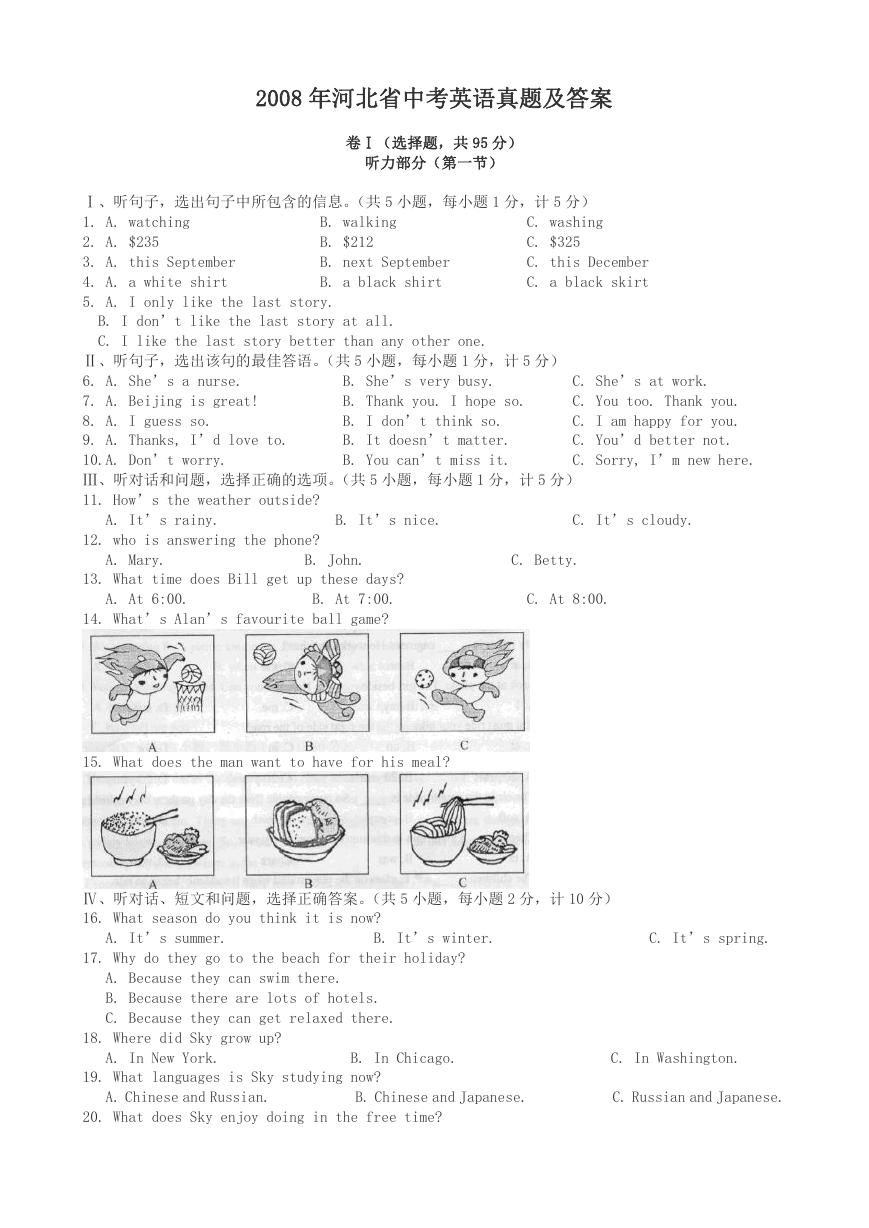
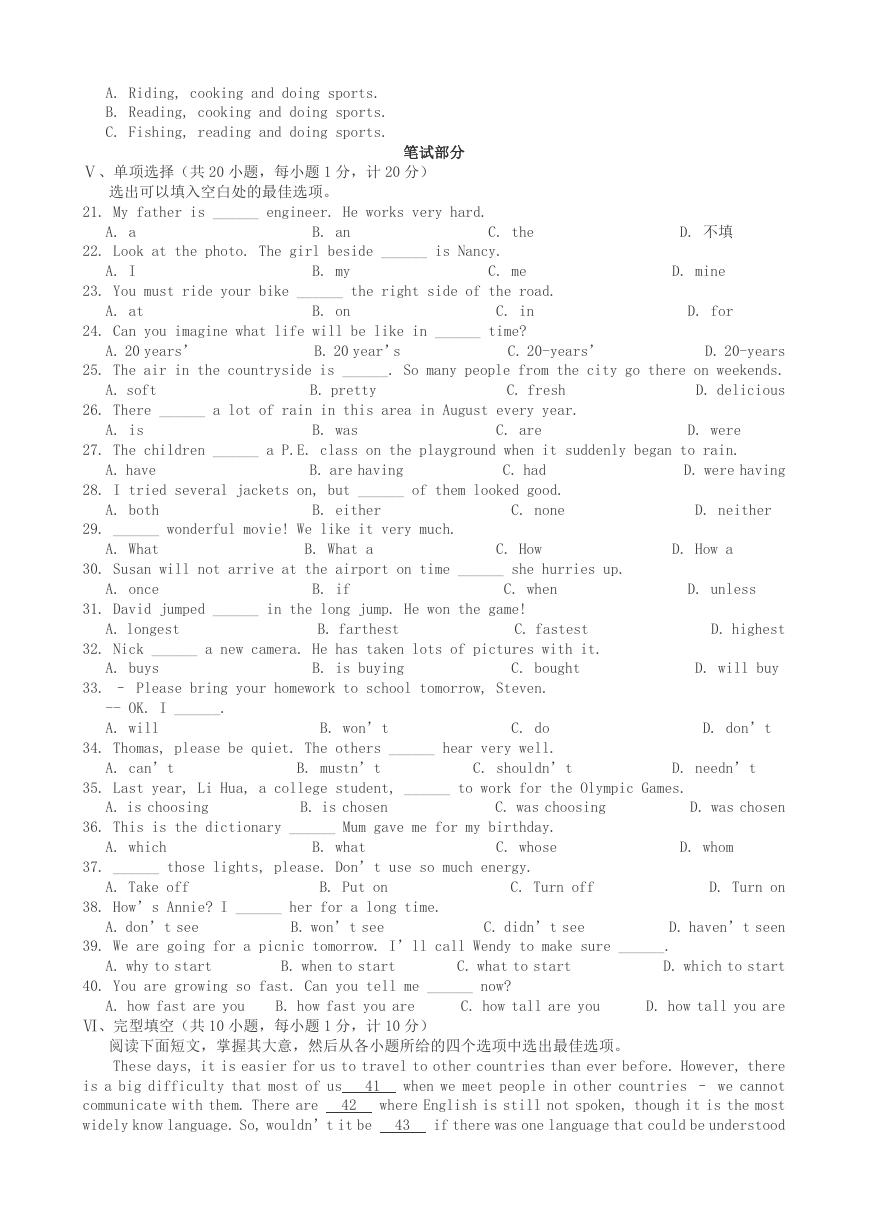
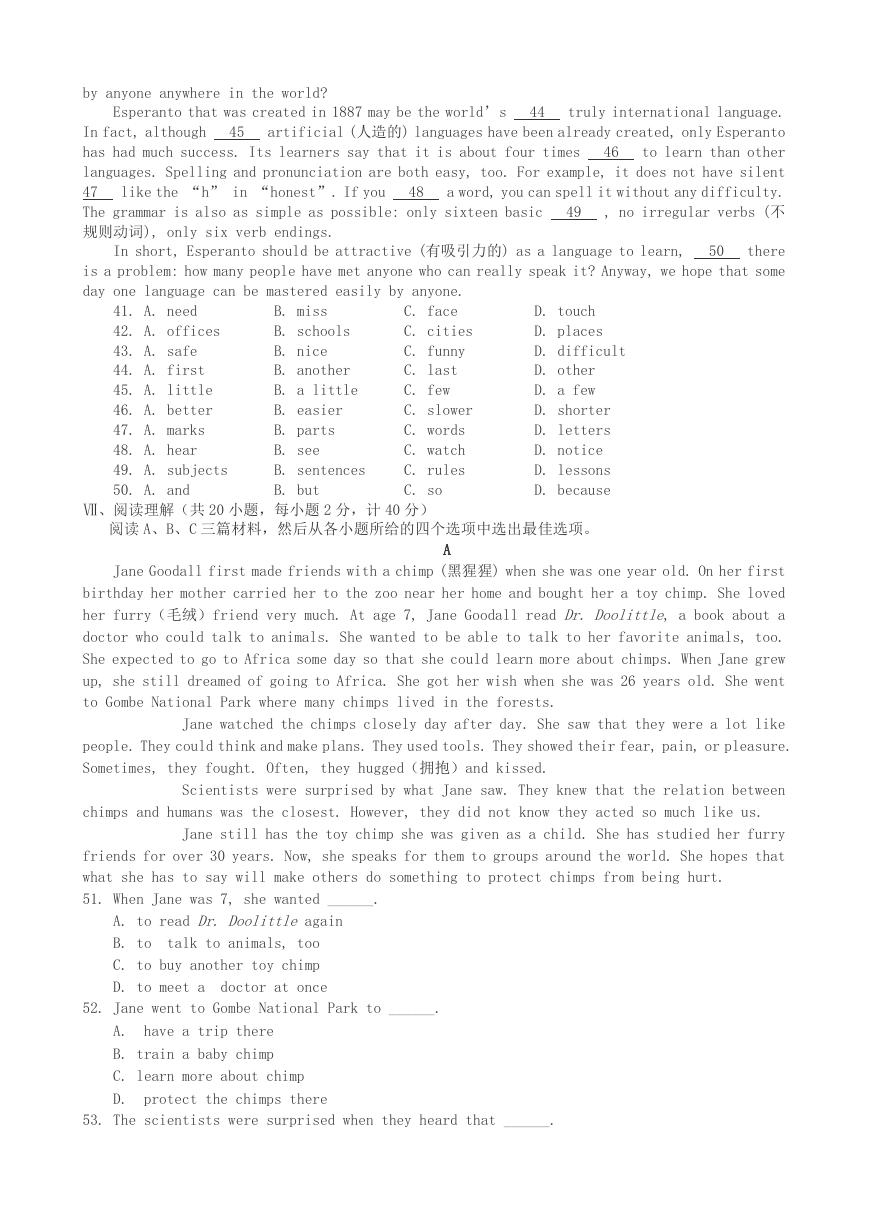
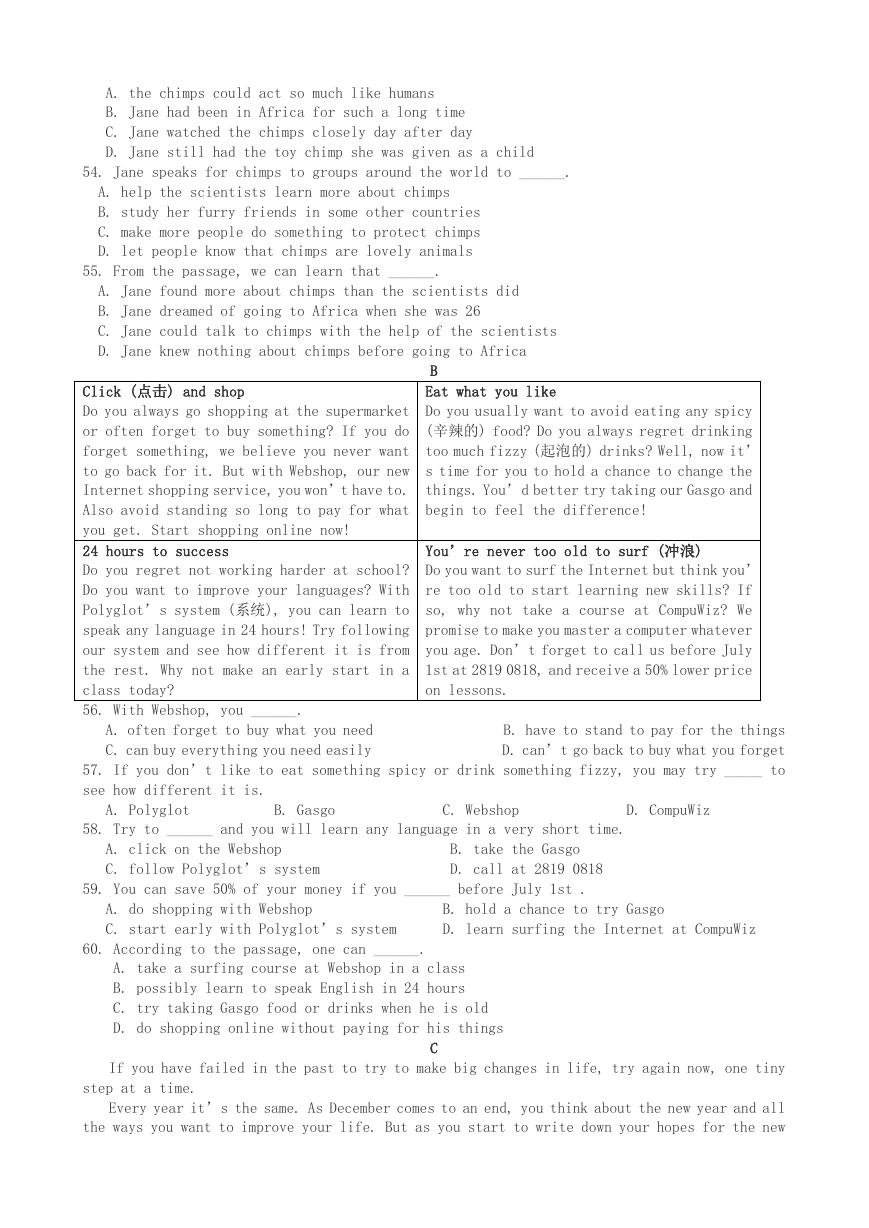
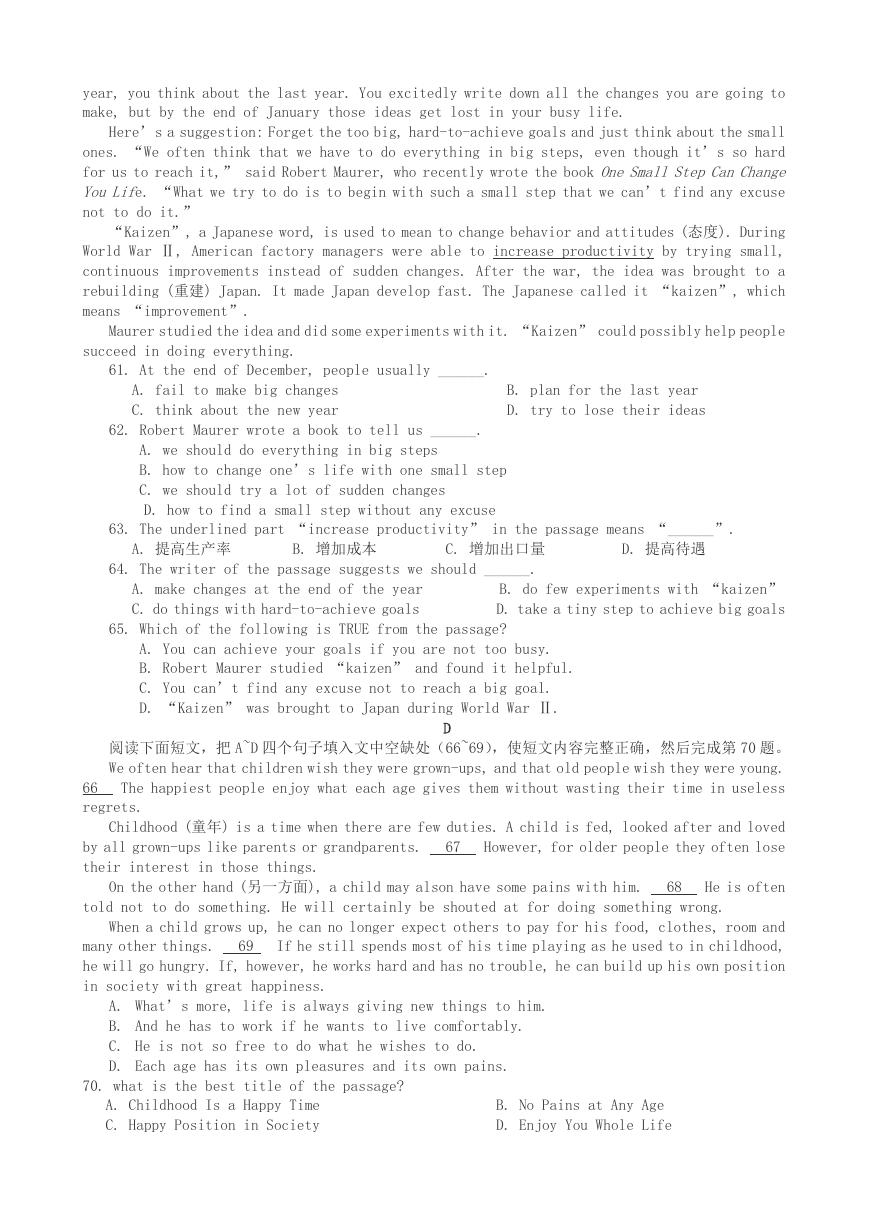
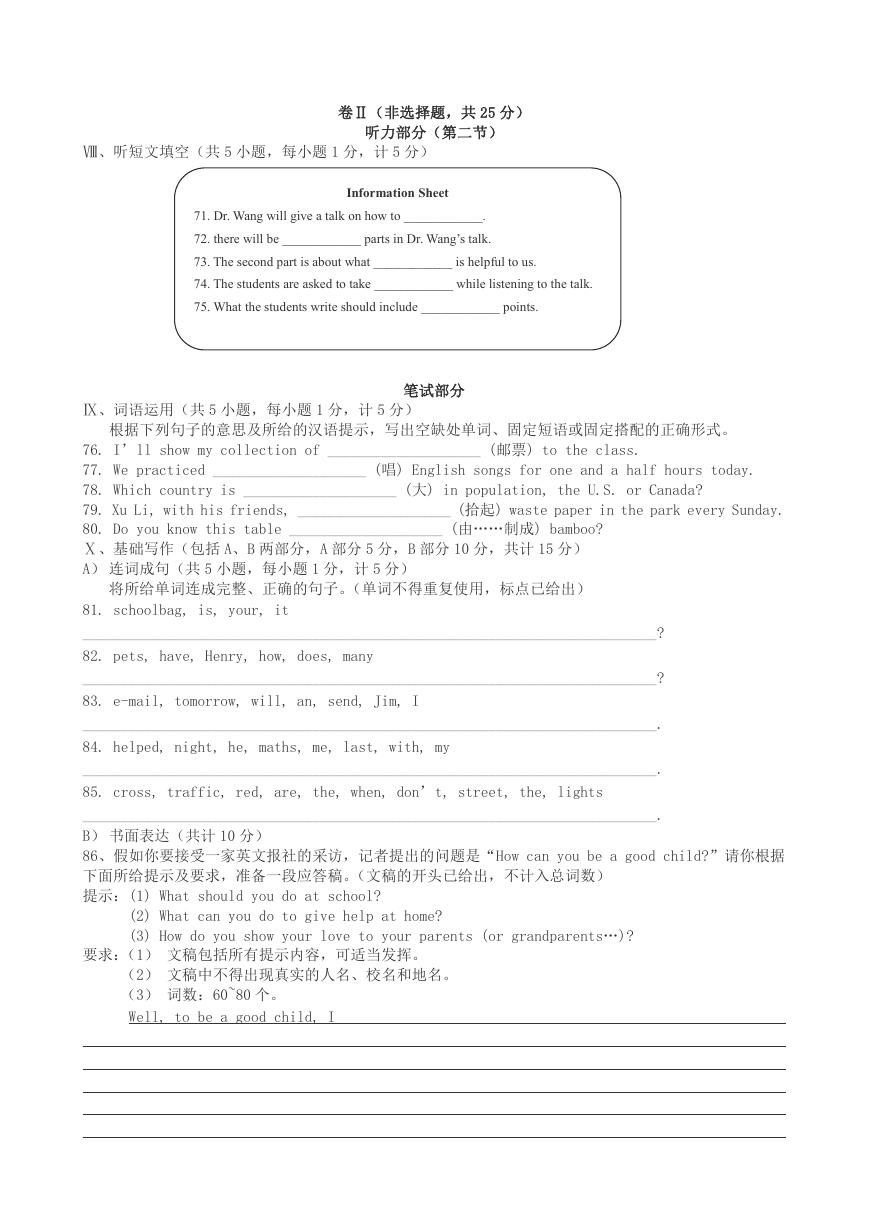










 2023年江西萍乡中考道德与法治真题及答案.doc
2023年江西萍乡中考道德与法治真题及答案.doc 2012年重庆南川中考生物真题及答案.doc
2012年重庆南川中考生物真题及答案.doc 2013年江西师范大学地理学综合及文艺理论基础考研真题.doc
2013年江西师范大学地理学综合及文艺理论基础考研真题.doc 2020年四川甘孜小升初语文真题及答案I卷.doc
2020年四川甘孜小升初语文真题及答案I卷.doc 2020年注册岩土工程师专业基础考试真题及答案.doc
2020年注册岩土工程师专业基础考试真题及答案.doc 2023-2024学年福建省厦门市九年级上学期数学月考试题及答案.doc
2023-2024学年福建省厦门市九年级上学期数学月考试题及答案.doc 2021-2022学年辽宁省沈阳市大东区九年级上学期语文期末试题及答案.doc
2021-2022学年辽宁省沈阳市大东区九年级上学期语文期末试题及答案.doc 2022-2023学年北京东城区初三第一学期物理期末试卷及答案.doc
2022-2023学年北京东城区初三第一学期物理期末试卷及答案.doc 2018上半年江西教师资格初中地理学科知识与教学能力真题及答案.doc
2018上半年江西教师资格初中地理学科知识与教学能力真题及答案.doc 2012年河北国家公务员申论考试真题及答案-省级.doc
2012年河北国家公务员申论考试真题及答案-省级.doc 2020-2021学年江苏省扬州市江都区邵樊片九年级上学期数学第一次质量检测试题及答案.doc
2020-2021学年江苏省扬州市江都区邵樊片九年级上学期数学第一次质量检测试题及答案.doc 2022下半年黑龙江教师资格证中学综合素质真题及答案.doc
2022下半年黑龙江教师资格证中学综合素质真题及答案.doc